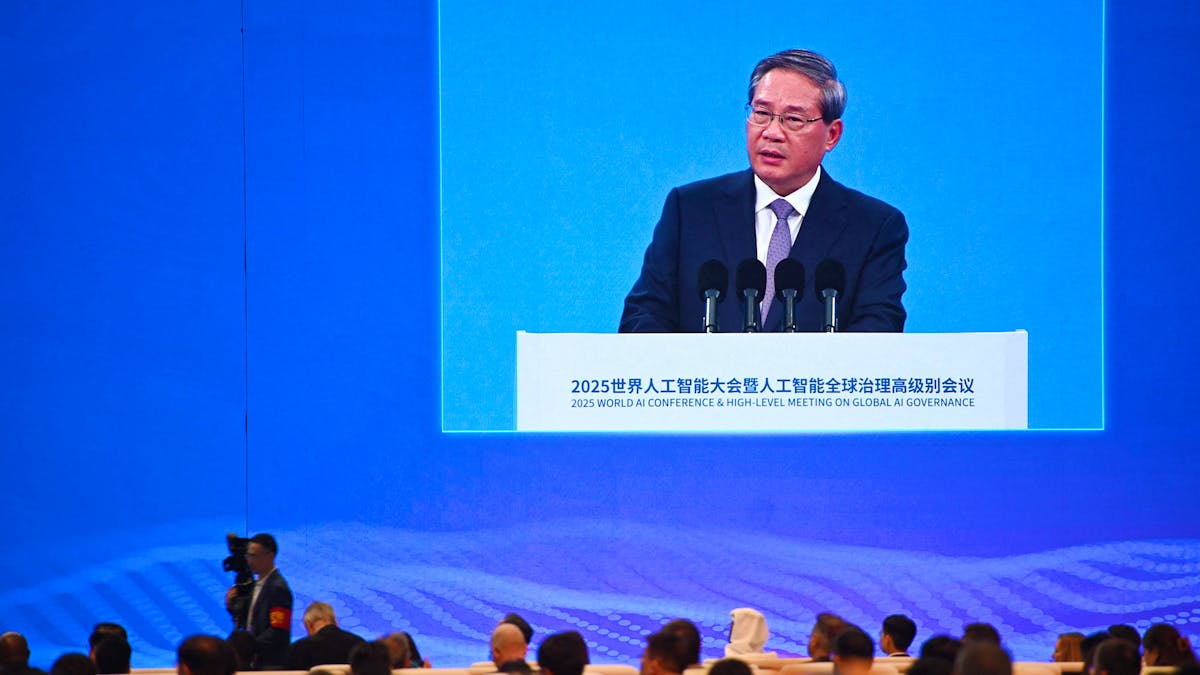He pleaded for a global consensus despite the Beijing-Washington rivalry on the matter.
Donald Trump unveiled this week an action plan to promote the unhindered development of American AI models in the United States and abroad, dismissing reservations about its possible abuses.
The American president thus breaks with the line of his Democratic predecessor Joe Biden, a supporter of controlled growth. “We will not let any other nation beat us” in the race for AI, declared Mr. Trump.
But on Saturday, at the opening of the World Artificial Intelligence Conference (WAIC) in Shanghai, Li Qiang called for good governance and sharing of resources, announcing in particular the creation of an organization, launched by China, intended to stimulate international cooperation in AI.
“The risks and challenges related to artificial intelligence are attracting widespread attention (…) Finding a balance between development and security requires an urgent broader consensus from the whole of society,” he stressed.
He did not give details of the new body although state media said “the first consideration” was for its headquarters to be based in Shanghai.
The organization is expected to “promote global governance featuring broad consultation, joint contribution and shared benefits,” state news agency Xinhua reported.
At a time when AI is being integrated into virtually every industry, its uses have raised important ethical questions, ranging from the spread of disinformation to its impact on employment, to the potential loss of technological control.
Like a baby tiger at home
During a speech at the Shanghai conference, Nobel Prize winner in physics Geoffrey Hinton used a metaphor to describe the current global situation.
According to him, the current attitude towards AI is like that of “a person who would adopt an adorable baby tiger as a pet”. “To survive,” you have to make sure you can train him not to kill you when he becomes an adult, he stressed.
Huge advances in AI technology in recent years have also brought it to the forefront of the US-China rivalry.
China “actively encourages” the development of open source AI and is willing to share its technological advances with other countries, especially developing ones, he stressed.
“If we establish technological monopolies, controls or barriers, artificial intelligence risks becoming the preserve of a small number of countries and companies,” Li Qiang further warned.
Vice Foreign Minister Ma Zhaoxu, for his part, warned against “unilateralism and protectionism” at a later meeting.
The United States has stepped up efforts in recent years to restrict exports of cutting-edge chips to China. Washington says it fears that they will serve to modernize the Chinese army and weaken the American position in the technological race.
The Chinese premier cited “the shortage of chips and computing capacity” among a list of obstacles to the development of the sector.
AI governance: a litmus test
Beijing has made AI a pillar of its plans for technological autonomy.
In January, Chinese start-up DeepSeek presented an artificial intelligence model with performance comparable to the best American systems, despite the use of less powerful chips.
AI is increasingly used in many sectors. However, its applications raise important ethical questions, whether it concerns disinformation or the risks of loss of control.
In a video message broadcast on Saturday, UN Secretary-General Antonio Guterres said AI governance would constitute “a litmus test for international cooperation”.
During the Paris summit on artificial intelligence in February, 58 countries, including China, France and India (the co-organizers), as well as the European Union and the African Union Commission, spoke out in favor of reinforced coordination of the governance of the sector.
But the United States had called for limiting regulation so as “not to kill a booming industry”.
Anne Bouverot, French President Emmanuel Macron’s special envoy to the Paris summit, highlighted in her speech in Shanghai the “urgent need” for global action. She called for a framework that was “open, transparent and effective, giving everyone the opportunity to have their views taken into account.”
AFP

